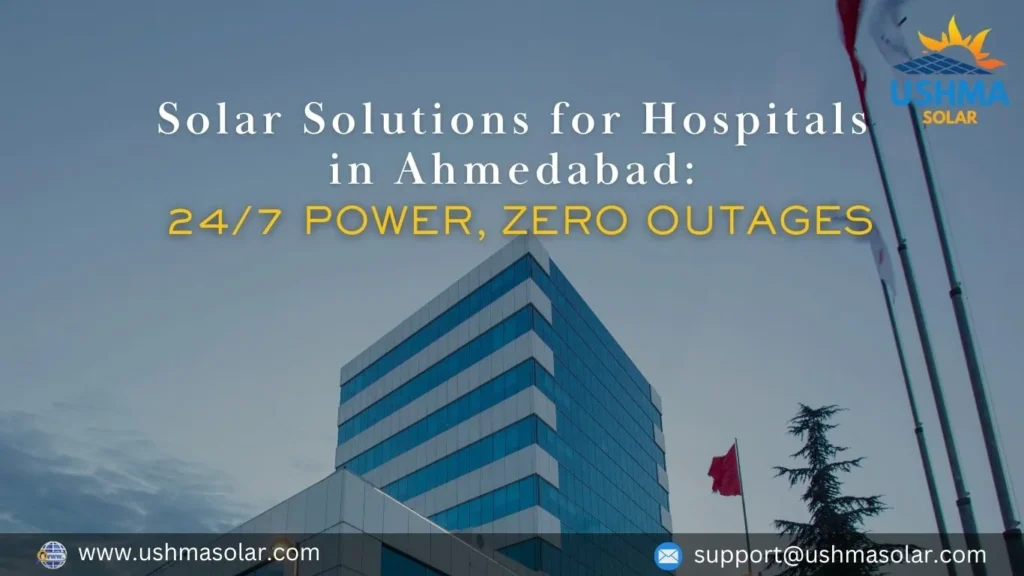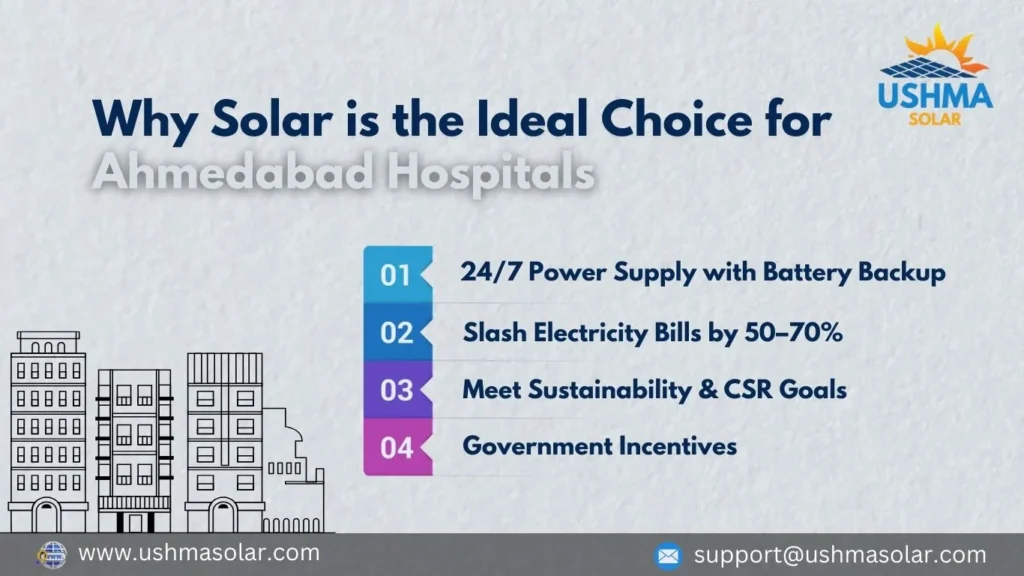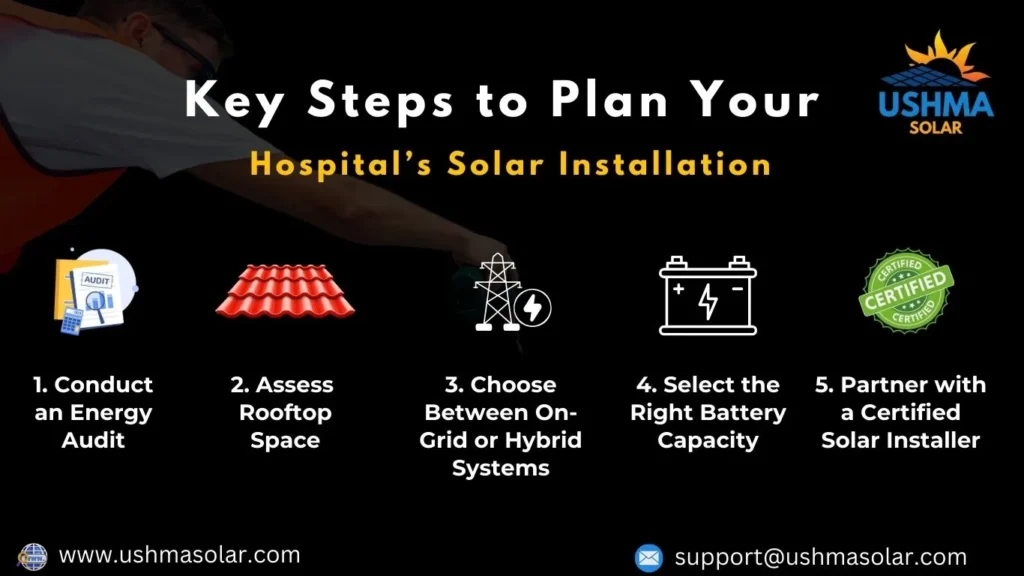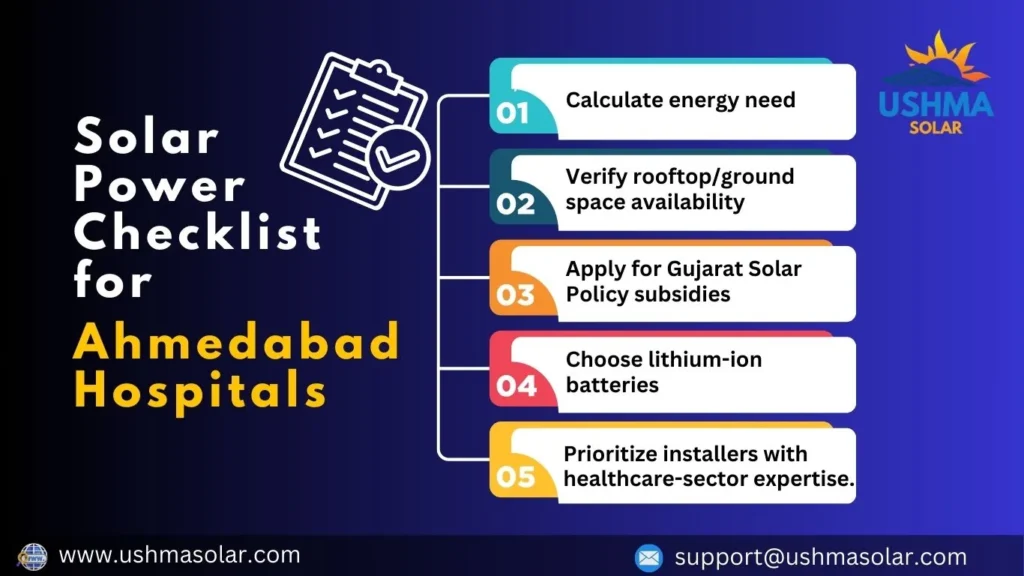
Why Hospitals in Ahmedabad Need Reliable Solar Power
In Ahmedabad, hospitals are lifelines for millions of people. From life-saving medical equipment to refrigeration for vaccines and medicines, uninterrupted power is non-negotiable. Yet, frequent grid outages, rising electricity costs (₹8–₹10 per unit), and aging infrastructure pose serious risks to patient care.
Solar energy, paired with battery storage, offers hospitals in Ahmedabad a cost-effective and fail-safe solution to ensure 24/7 power, reduce operational expenses, and uphold their commitment to saving lives.
Why Solar is the Ideal Choice for Ahmedabad Hospitals

- 24/7 Power Supply with Battery Backup
- Problem: Power cuts in Ahmedabad can disrupt critical operations like ICUs, operation theaters, and cold storage for medicines.
- Solution: Solar systems with lithium-ion or lead-acid batteries store excess energy generated during the day, providing seamless backup during outages or nighttime.
- Example: A 100 kW solar system with a 200 kWh battery can power essential equipment for 8–10 hours during a blackout.
- Slash Electricity Bills by 50–70%
- Hospitals are energy-intensive, with monthly bills often exceeding ₹5–10 lakhs. Solar panels can reduce dependence on expensive grid power.
- Save ₹3–6 lakh/month for a mid-sized hospital with a 100 kW solar system.
- Meet Sustainability & CSR Goals
- Enhances reputation as an eco-conscious healthcare provider.
- Hospitals can reduce their carbon footprint by 200–500 tons of CO2 annually with solar energy.
- Government Incentives
- Net metering allows hospitals to earn credits by feeding excess solar power to the grid.
- For the latest subsidy details and eligibility criteria, consult the Gujarat Energy Development Agency (GEDA) directly or visit their official website.
Solar System Sizes for Ahmedabad Hospitals
| Hospital Size | Recommended Solar System | Battery Backup | Annual Savings (₹) | Rooftop Space Required |
|---|---|---|---|---|
| Small Clinic (10–20 beds) | 20–30 kW | 40–60 kWh | ₹3–6 lakh | 2,000–3,000 sq. ft. |
| Mid-Sized Hospital (100 beds) | 100–200 kW | 150–250 kWh | ₹10–20 lakh | 10,000–20,000 sq. ft. |
| Large Hospital (300+ beds) | 500 kW+ | 500–1000 kWh | ₹50–80 lakh | 50,000+ sq. ft. |
Key Steps to Plan Your Hospital’s Solar Installation
For hospitals new to solar energy, careful planning ensures a smooth transition. Here’s how to get started:

- Conduct an Energy Audit
- Analyze your hospital’s daily and monthly energy consumption.
- Identify critical areas (ICUs, labs, cold storage) that need priority backup.
- Assess Rooftop Space
- Hospitals with limited space can opt for canal-top or ground-mounted solar systems.
- Ensure your rooftop can support solar panels (1 kW requires ~100 sq. ft. of shadow-free space).
- Choose Between On-Grid or Hybrid Systems
- On-Grid: Connects to the grid for net metering benefits (ideal for reducing bills).
- Hybrid: Combines solar with battery storage (best for 24/7 backup).
- Select the Right Battery Capacity
- Lithium-ion batteries last longer (10+ years) and require less maintenance than lead-acid.
- Calculate backup duration needed for critical equipment (e.g., 8–12 hours for ICUs).
- Partner with a Certified Solar Installer
- Look for the best solar company that is MNRE/GEDA-approved and has experience in healthcare projects.
- Ensure they offer emergency maintenance services to address issues quickly.
Solar Power Checklist for Ahmedabad Hospitals

✅ Calculate energy needs with a professional audit.
✅ Verify rooftop/ground space availability.
✅ Apply for Gujarat Solar Policy subsidies (up to ₹10 lakh).
✅ Choose lithium-ion batteries for long-term reliability.
✅ Prioritize installers with healthcare-sector expertise.

FAQs
Can solar panels power MRI machines and ventilators?
Yes! Solar systems with sufficient battery storage and inverters can handle high-load medical equipment.
What if there’s no sunlight for days?
Batteries store surplus energy, and net metering ensures grid power fills any gaps.
How long does installation take?
6–8 weeks for a 100 kW hospital system, with minimal disruption to operations.
Are solar panels safe for hospital rooftops?
Absolutely. Installers use non-penetrating mounts to protect rooftop integrity.
Conclusion
For hospitals in Ahmedabad, solar energy is not just about cost savings—it’s about saving lives without interruption. With Gujarat’s sunny climate (300+ days of sunlight) and supportive policies, transitioning to solar is a strategic move for healthcare institutions.
By partnering with a trusted solar provider, hospitals can ensure 24/7 power reliability, reduce operational costs, and contribute to a greener future.
Ready to Ensure Uninterrupted Power for Your Hospital? Contact Ushma Solar for a free consultation and customized solar solution designed for healthcare needs.
